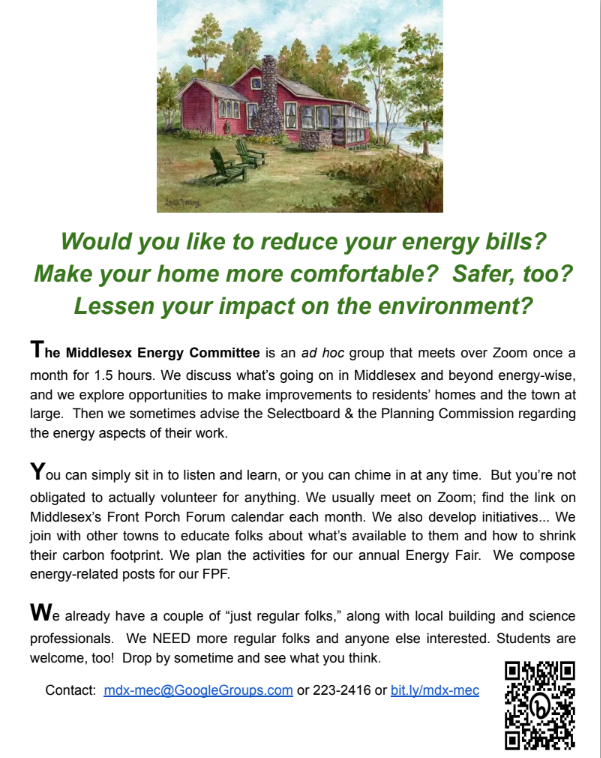Middlesex Energy Committee
Try out the calculator below to find rebates you're eligible for:
|
What the Committee Does We promote energy efficient building/remodeling, home heating, and transportation options. It provides information and guidance to town residents and municipal buildings alike. The Committee meets the first Monday of each month at 7 pm. See the Calendar for specific dates and meeting details. Contact us using the form below for guidance on how to start saving energy in your home! |
Energy Plan In March 2022, Middlesex voters adopted an "enhanced energy plan." It describes steps Middlesex will take to reduce its energy use and increase the share from renewable sources to meet the State goals for 2050. |
|
Resources Building Efficiently: A guide to making energy efficiency a key part of building or remodeling. Energy Cost Model: A comparison of the cost to own and heat a house insulated at three different levels. Streetlighting and Outdoor Lighting: Recommendations for outdoor lighting choices Webinar Series: Middlesex homeowners share their experience building an efficient home. Efficiency Vermont: Capstone Community Action Weatherization Program:
Utilities:
Electric Vehicles:
|
Considering an Electric Lawnmower? Many thanks to the 39 people who completed our survey on lawn mowers: Most (29) use a gas mower; 5 use a battery mower; 3 pay someone else; 1 uses a corded electric mower; and 1 has no lawn to mow. Of the 29 gas owners, 18 are satisfied or very satisfied with their mower, 10 are neutral, and 1 is very dissatisfied. Of the 6 electric owners, 5 are very satisfied and 1 is neutral. We've attempted to address the questions you raised when thinking about whether an electric mower could be in your future. For tons of info on electric mowers, check out http://www.MowElectric.org . Question: How affordable is an electric mower? Answer: Using Tractor Supply as an example, they currently sell 21"-22" gas push mowers for $239 to $599, while battery-electric ones of that size range from $449 to $749, with 1 or 2 batteries included (and smaller ones without a battery are as cheap as $179). For $199, you can get an electric corded 20" push mower. (We know of two Middlesexers who've used corded mowers with great satisfaction.) Question: What's the cost over time? Answer: As an example, Washington Electric Coop currently charges 22.22 cents per kilowatt-hour (kwh). To charge my 7.5 amp-hour battery takes about 0.9 kwh, or 20 cents. That works out to about $1 to mow for 4 hours. (My gas mower used about 0.75 gallon of gas over 4 hours or $2-$3.) An electric mower does not use an air filter, oil, spark plug, or carburetor. Lithium batteries do eventually lose some of their capacity, but a replacement likely won't be necessary for a number of years. They can be recharged hundreds of times before losing even 20% capacity. Question: Can I get tools with interchangeable batteries? Answer: Several companies (e.g., EGo, Ryobi) now sell product lines of yard tools that all use the same battery, and they sell their tools without batteries so you aren't forced to shoulder that cost every time. Question: What about riding mowers? Answer: We ourselves haven't used riding electric mowers, but they are gaining traction; they're available at big box stores and Ace Hardware carries a 56" zero-turn mower with 40 amp-hours of battery for $5,500 (compared to gas ones they sell for $3,200-$4,400). Question: What's their capacity like? Answer: Electric push mowers come with various battery sizes, typically running for anywhere from 45 to 90 minutes on a charge. As you acquire other tools, consider buying one of the same brand that includes another battery to double your mowing time. The time to recharge depends on the size of the battery; a smaller one might take 30 minutes and a larger one a couple of hours. Question: What about their durability? Answer: Electric mowers are simpler machines than gas mowers, with many fewer moving parts. They also tend to be lighter-weight. As a result, assuming comparable craftsmanship, we'd expect the electric mower to be at least as durable. Many established brands (e.g., Ariens, Husqvarna, DR, DeWalt, Stihl, Toro) with known track records now produce them. Question: Can they handle steep terrain, thick grass, and leaf-mulching? Answer: Self-propelled electric mowers are commonly available, and their relatively light weight facilitates navigating steep terrain. Tall, thick grass and other heavy material can all be tackled. With a smaller battery mower, I find it good to keep my grass from getting very tall; if it gets ahead of me, I raise the deck and mow again a few days later. Point: E-mowers are all well and good, but only if I'm using clean electricity. Response: Fossil fuel-generated electricity is not good, but the extra environmental costs of refining gasoline, extra transportation, & wasteful, inefficient combustion in a small engine make this option even worse. The good news is that most of the electricity in Middlesex is from renewable sources, so you can rest easy. If you have solar panels, they're a great complement to electric yard tools. Point: My current gas mower is working fine. Response: While we'd usually agree that it's better to keep using a tool if it ain't broke, consider the effects of a gas yard tool: they pollute the air many times more than a gas car, contribute to climate change, disrupt the neighborhood with noise, and are potentially dangerous (high heat can burn you/your home; leaking fuel/oil contaminate groundwater). Point: Lawns should be smaller. Response: Agreed! Perennials, permaculture, mulched paths, vegetables, or letting grasses go until fall for a single mowing are all other options. Question: Where can I try a battery mower? Answer: The Energy Fair! Listings for similar events appear in Green Energy Times (greenenergytimes.org) and at https://mowelectric.org/events/ . |
